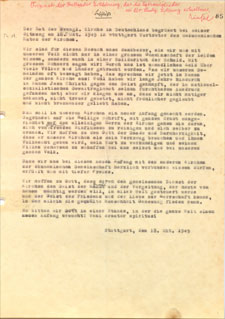After the War: Stuttgart Declaration of Guilt
Following the collapse of and liberation from Nazi rule, the representatives of the Councils of Brethren of the Confessing Church gathered in Frankfurt am Main at Martin Niemöller’s invitation for a first meeting (“National Council of Brethren Conference”, August 21-24, 1945). Many members of the opposition from differing ecclesiastical factions were thus freely in dialogue again for the first time. Hans Asmussen was elected chairman.
Following fierce controversies about the future course of Protestantism at the church leadership conference in Treysa, Hesse (August 27–31, 1945), the “Evangelical Church in Germany” was constituted as a federation of churches. Asmussen became a member of the Evangelical Church in Germany’s Council and president of its Church Office based in Schwäbisch Gmünd, where he had his parish.
His collaboration on the “Stuttgart Declaration of Guilt” in October of 1945, which acknowledged the churches’ complicity in Nazi era crimes to the nascent World Council of Churches, became especially significant. The famous formulation, We accuse ourselves for not standing to our beliefs more courageously, for not praying more faithfully, for not believing more joyously, and for not loving more ardently came from Asmussen. These comparatives were intended to make clear that even the Confessing Church had fallen far short of what should have been its mission in the face of the dictatorship.
Admittedly, the statements remained less than concrete; a clear statement on the Holocaust in particular was not to be found at that time. When Asmussen read the text aloud before the representatives of the World Council, however, they were impressed that the men speaking had themselves suffered under the regime and, in part, had long prison terms behind them.
Asmussen was provost of Kiel from 1948 to 1955. Even in retirement in Heidelberg, he remained a sought-after author and lecturer. He devoted himself to ecumenism with heightened attention and was fiercely attacked for this. He was reproached for “Catholicizing” tendencies. He died on December 30, 1968 in Speyer and was buried in Kiel. His tombstone reads: Ut omnes unum sint (... that they may all be one, John 17:21).
Source / title
- © Evangelisches Zentralarchiv in Berlin, 2/1790

